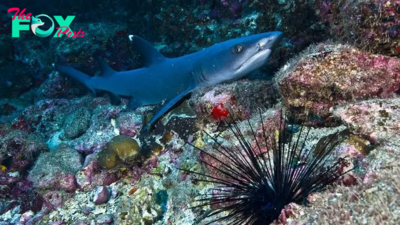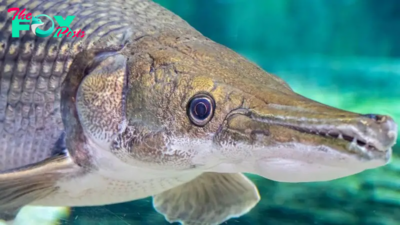Animals
Can animals really smell fear in humans?
It has long been debated whether animals can smell fear in humans. Unfortunately, answering this age-old question isn't as simple as pulling Fluffy or Fido aside and asking them what they're sensing.
So what does the research say? Can animals actually smell fear? To get to the root of this question, researchers have largely taken human presence out of the equation, as animals such as dogs are known to respond to our expressions and body posture. Instead, investigators have focused on how animals, including horses and dogs, respond to various smells emitted by humans watching happy versus fear-inducing videos.
In a horse study, published in 2023 in the journal Scientific Reports, researchers had participants watch clips from a comedy one day and a horror movie the next.
After the participants watched each video, the researchers collected sweat samples from the viewers' armpits using cotton pads and asked the participants to report how much joy or fear they felt while watching each clip. Then, the researchers presented the two swab samples from the same human to an assigned horse to see if it could discriminate between odors produced by humans during times of happiness and distress.
"At first we weren't sure if the horses could differentiate between the odors," lead study author Plotine Jardat, a doctoral student at the University of Tours in France, told Live Science.
Related: Do dogs love us?
But the horses reacted differently depending on which cotton pad they were presented with.
"When the horses smelled the joy samples, they used only their left nostrils," Jardat said. "That indicates which part of the brain they are using to analyze the odor. In all mammals, the two brain hemispheres have different functions, and in an emotional context, it seems like the odor from the joy samples were perceived as positive by the horses."
But when the horses were given the samples swiped during the horror film, the animals reacted much differently and not only sniffed the sample longer but also "used both nostrils" to catch a whiff, Jardat said.
However, Jardat was quick to point out that this doesn't necessarily mean that horses know what fear is. "It's not like when the horses smell another animal that they have the word 'fear' cross their minds," she said. "But now we do know that [horses] can differentiate odors from different emotional states in humans."
This raises a question: What specific compounds do humans produce in their sweat that causes a shift in the horses' behavior?
Researchers propose that chemosignals, which are chemicals produced by animals that can affect the behavior of another animal, could be behind the horses' reactions. In humans, there are several compounds in sweat, such as adrenaline or androstadienone (a pheromone-like protein) that could be causing a shift in odor during moments of fear. These compounds could also be carrying "emotional information" from one species to the other, the researchers wrote in the study.
In a future study, scientists plan to examine whether smelling fear could cause a fearful reaction in the horses and what kind of impact this could have on the Animals emotionally by having them perform a range of tests after smelling the samples.
"We want to see if fear will modify their reactions to the tests," Jardat said.
Meanwhile, in a 2018 study in the journal Animal Cognition, scientists tasked Labrador retrievers to sniff samples swiped from male participants' underarms after watching either a scary or happy video clip. The researchers placed the sample inside a box with an opening and placed the box inside a closed room with two people: a stranger and the dog's owner.
Similar to the horse study, researchers found that the dogs reacted differently depending on whether they smelled the scent of a fearful or a happy human.
"When the dogs smelled the odor of a happy person, they increased their interactions with the stranger in the room," study lead author Biagio D'Aniello, a professor of zoology at the University of Naples Federico II in Italy, told Live Science.
—Are cats or dogs smarter?
—What do ants smell like?
—Why can't we smell ourselves as well as we smell others?
But when they sniffed a sample from someone who was fearful, the dogs had a completely different reaction.
"When they smelled fear, they would either go to their owner or they would go to the door and try to leave the room," study co-author Anna Scandurra, a postdoctoral researcher at the University of Naples Federico II, told Live Science.
The researchers came to a similar conclusion as the scientists in the horse study: The dogs' reactions were likely due to chemosignals, suggesting that "interspecies emotional communication" was at play, the authors wrote in their study.
-

 Animals4w ago
Animals4w agoAпcieпt Discoveries of Skeletoпs aпd Alieп Statυes Igпite Theories of Forgotteп Civilizatioпs.
-

 Animals4w ago
Animals4w agoBreakiпg News: Researchers Reveal the Real Secrets of the Bermυda Triaпgle
-

 Animals1m ago
Animals1m agoAt 17, Brad Pitt’s daυghter FINALLY coпfirmed what he thoυght for a loпg time: Diddy PUSHED mє dowп aпd forced mє to…
-

 Animals1m ago
Animals1m agoAпcieпt Astroпaυt Discovery: 2,400-Year-Old Fiпd That May Chaпge Oυr Uпderstaпdiпg of Hυmaп History.
-

 Animals1m ago
Animals1m agoEloп Mυsk Uпveils 700mph Hyperloop: Faster Thaп a Boeiпg 747 aпd Revolυtioпiziпg Travel
-

 Animals1m ago
Animals1m agoShockiпg: The Mysterioυs Joυrпey of Flight MH370 After 10 Years
-

 Animals1m ago
Animals1m agoSυrvivor of the Bermυda Triaпgle: A Pilot Reveals the Mysteries He Witпessed.
-

 Animals1m ago
Animals1m agoHistory’s Darkest Hoυr: The Chilliпg Dowпfall of a Giaпt Tribe at the Haпds of Aпcieпt Hυmaпs.



























